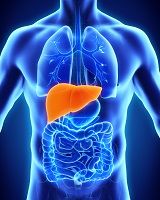Course of Progressive Familial Intrahepatic Cholestasis II Varies
Children who develop progressive familial intrahepatic cholestasis Type II (PFIC-II) may get better-at least for a while-without getting a liver transplant. But children borne with the condition do not, a team from Belgium found. Bile salt export pump plays a key role.

Children who develop progressive familial intrahepatic cholestasis Type II (PFIC-II) may get better—at least for a while—without getting a liver transplant. But children borne with the condition do not, a team from Belgium found. Bile salt export pump plays a key role.
In an abstract presented April 23 at the 2015 International Liver Congress in Vienna, Austria, Sharat Varma and colleagues at Cliniques Universitaires Saint Luc, Brussels and Katholiek Universiteit Leuven, Leuven, PFICII children with late onset, alanine amino transferase levels of under 165 IU/L and cytoplasmic bile salt exit pump (BSEP) “are likely to respond at least transiently to non-transplant treatment while patients with neonatal cholestasis do not.
”
The team studied respective cases of 23 children with PFIC-II. They looked at clinical, biochemical and histological characteristics both initially and after treatment with ursodeoxycholic acid or with UCDA and partial biliary diversion. They defined a response to treatment as normalization of pruritis, disappeance of jaundice, and normalization of alanine amino transferases.
Of the 23 children 12 did not respond to treatment, 1 had a partial response, and 10 had a positive response.
Seven patients were still responding at a median of 20 months after treatment, 1 died of an unrelated cause, and 3 relapsed.
The median relapse-free survival time was 72 months.
“All but one PFIC II patients had abnormal or no BSEP expression,” Varma wrote. “De novo or retargeted canalicular expression of BSEP can occur under treatment amongst the responders,” they said.